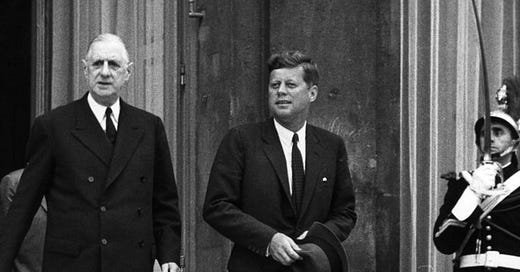Charles de Gaulle’s Theory on Who Killed JFK
"They don’t want to know. They don’t want to find out. They won’t allow themselves to find out.”
If you had asked me 20 years ago when I was a graduate student studying history who killed John F. Kennedy, I would have said Lee Harvey Oswald. My answer would have went something like this:
Oswald killed John F. Kennedy. Now, he may have had some outside help—since I have serious doubts he could have fired all three of those shots. (I’ve talked to professional military snipers who’ve said they couldn’t have made those three shots with that Mannlicher-Carcano rifle). But Oswald was certainly involved in the killing, and to suggest otherwise is to suggest a vast conspiracy.
Decades later, I would no longer answer this question this way. And I’ll explain why in a series of posts over the next few months. But I’d like to begin by pointing out French President Charles de Gaulle believed there was foul play, and not from Lee Harvey Oswald.
After returning from John F. Kennedy’s funeral, de Gaulle, who narrowly survived his own assassination attempt, spoke candidly to his Information Minister Alain Peyreffite about his belief that JFK was killed by state security forces.
“What happened to Kennedy is what nearly happened to me,” said de Gaulle, the target of a CIA coup attempt in 1961 orchestrated by Allen Dulles. “His story is the same as mine…The security forces were in cahoots with the extremists.”
“Do you think Oswald was a front?” Peyrefitte asked de Gaulle.
I’ll post de Gaulle’s response in full, which comes from David Talbot’s book The Devil’s Chessboard.
“Everything leads me to believe it. They got their hands on this communist who wasn’t one, while still being one. He had a sub par intellect and was an exalted fanatic—just the man they needed, the perfect one to be accused. . . . The guy ran away, because he probably became suspicious. They wanted to kill him on the spot before he could be grabbed by the judicial system. Unfortunately, it didn’t happen exactly the way they had probably planned it would. . . . But a trial, you realize, is just terrible. People would have talked. They would have dug up so much! They would have unearthed everything. Then the security forces went looking for [a clean-up man] they totally controlled, and who couldn’t refuse their offer, and that guy sacrificed himself to kill the fake assassin—supposedly in defense of Kennedy’s memory!
“Baloney! Security forces all over the world are the same when they do this kind of dirty work. As soon as they succeed in wiping out the false assassin, they declare that the justice system no longer need be concerned, that no further public action was needed now that the guilty perpetrator was dead. Better to assassinate an innocent man than to let a civil war break out. Better an injustice than disorder.
“America is in danger of upheavals. But you’ll see. All of them together will observe the law of silence. They will close ranks. They’ll do everything to stifle any scandal. They will throw Noah’s cloak over these shameful deeds. In order to not lose face in front of the whole world. In order to not risk unleashing riots in the United States. In order to preserve the union and to avoid a new civil war. In order to not ask themselves questions. They don’t want to know. They don’t want to find out. They won’t allow themselves to find out.”
Talbot gets De Gaulle’s comments from Peyreffite’s 2002 memoir. (The memoir was published in France, but never translated to English.)
Some might doubt the veracity of the words, considering that they were published more than three decades after de Gaulle’s death. But it’s important to note that Peyrefitte—a celebrated French scholar, politician, and author—died in 1999.
His memoir was published posthumously, which suggests two things: 1) he had no reason to lie; 2) he had concerns about sharing this information while alive.
Considering that Peyrefitte, like de Gaulle, narrowly survived an assassination attempt (his driver was not so lucky), it’s hard to blame him for waiting to share this information until after his death.
In any event, I’ve come to the conclusion that de Gaulle was correct in his assessment of the JFK assassination: “They don’t want to know. They don’t want to find out. They won’t allow themselves to find out.”
This is why, six decades after JFK’s assassination, the CIA is allowed to refuse to release all documents related to the assassination in defiance of federal law.
Americans deserve the truth. One person who decided he was going to get to the truth was Kennedy’s brother and attorney general, Bobby Kennedy. He didn’t believe the Warren Commission’s findings and was determined to get to the bottom of the assassination.
In 1968, he too was assassinated—under circumstances that the forensic evidence suggests was not as clean cut as many today believe.




